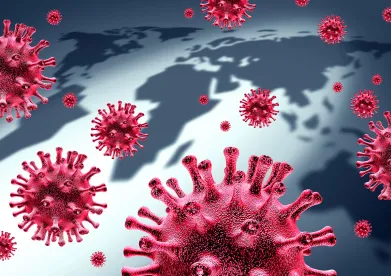With the recent resurgence of the pandemic, federal, state, and local workplace guidance continues to evolve. Employers must ensure that they are in compliance with updated guidance, develop a comprehensive safety plan, effectively communicate it to employees, and remain vigilant.
New York
On Saturday, October 31, Governor Cuomo discontinued the COVID-19 Travel Advisory which had recently restricted travel from as many as 41 states. Effective November 4, travelers coming to New York from all states other than New Jersey and Connecticut must take a COVID-19 test within three days before arriving in New York and a second test on or after the fourth day after entering the state. Thus, all travelers now must quarantine for at least a 3-day period before taking a COVID-19 test on or after the fourth day. As long as both tests come back negative, the quarantine period can end. Anyone opting not to take the test four days after arrival in New York must still complete a 14-day quarantine period. New Yorkers returning from travel under 24 hours outside of the state do not need to take a test before returning to New York, but still must take a test after re-entering New York. Though this testing policy does not apply to persons returning to New York from New Jersey or Connecticut, Governor Cuomo continues to urge New Yorkers to avoid non-essential travel between neighboring states to the extent possible.
Given the rise of the virus in certain geographic locations, New York State also has issued a “cluster action initiative.” This initiative is evolving depending on the circumstances and statistics. The initiative presently does not impose a quarantine on employees who may live in these areas but does close certain non-essential businesses in those areas, among other restrictions.
The most comprehensive resource for New York State workplace guidance continues to be the New York Forward website; it provides reopening guidance by industry and sample safety plans. Employers must certify their safety plans online. All New York employers should be familiar with this site and periodically check it for updated information. General safety categories currently include physical distancing (limiting the number of occupants at any given time to no more than 50% of the maximum capacity, 6 feet of distance at all times, etc.); providing protective equipment (including masks and requiring that they be worn in common areas); hygiene and cleaning (follow Centers for Disease Control (“CDC")-required cleaning and maintain cleaning logs, provide and maintain hygiene stations, provide and encourage use of cleaning supplies, regular cleaning, etc.); communication (affirm the guidelines, post signs, train personnel, maintain logs of close contact, notify close contacts of the virus); and screening (implement daily mandatory health screening assessment, such as a questionnaire, for employees, contractors, visitors, etc.).
New Jersey
On October 28, Governor Murphy issued Executive Order No. 192 (the “New EO”), which becomes effective November 5 at 6:00 a.m. While the New EO imposes additional requirements on New Jersey employers, the requirements are generally consistent with CDC guidance and the guidance in effect in New York. The New EO mandates that all employers, at a minimum:
-
Require individuals at the worksite to maintain at least 6 feet distance from others to the maximum extent possible (and where not possible, ensure that masks are worn and install physical barriers between workspaces wherever possible)
-
Require employees and visitors to wear masks when entering the worksite, subject to certain limited exceptions and at the employer’s expense
-
Provide approved sanitization materials to employees and visitors at no cost
-
Ensure that employees practice hand hygiene and provide sufficient break time for that purpose
-
Routinely clean and disinfect all high-touch areas in accordance with Department of Health and CDC guidelines
-
Conduct daily health checks, such as temperature screenings, visual symptom checking, self-assessment checklists and/or health questionnaires, prior to each shift, consistent with CDC guidance
-
Exclude sick employees from the workplace and follow requirements of applicable sick leave laws
-
Promptly notify employees of any known exposure to COVID-19 at the worksite (subject to confidentiality rules)
There also will be an online complaint intake form that workers can submit if employers do not follow these rules, and there will be investigatory and enforcement procedures put into place to ensure compliance.
The New Jersey travel advisory also continues in effect. The self-quarantine is voluntary, but compliance is “expected.”
In addition, due to spikes in COVID-19, effective October 27, the City of Newark issued new restrictions primarily focused on stores and restaurants. These restrictions initially will be in effect for a period of two weeks, and will be reassessed at the conclusion of that period. Specifically, all stores except supermarkets, pharmacies, and gas stations must close at 8 p.m. every day; all restaurants, bars, and similar businesses must close their indoor service at 8 p.m. and outdoor service at 11 p.m. and must also take temperatures of all patrons coming inside and ask them whether they been in touch with anyone with COVID-19; all barbershops, beauty parlors, nail salons, and related establishments must restrict access to patrons having appointments and not allow inside waiting; all gyms must clean and sanitize for the first 30 minutes of each hour; and Newark is discouraging all parties, indoor and outdoor festivals, and large family gatherings until further notice. One other important item for all New Jersey businesses is that all indoor establishments must have sanitizer available.
Federal Updates
On October 21, the CDC updated its definition of “close contact” to state that a person should be considered to have had a close contact exposure if the person was within six feet of an infected individual “for a cumulative total of 15 minutes or more over a 24-hour period” (as compared with the prior guidance, which stated that close contact exposure existed if a person was within six feet of someone infected for 15 consecutive minutes or longer). This change has important ramifications and will result in broadened circumstances when quarantine is necessary. Both New York and New Jersey guidance reference CDC guidance and this new definition of close contact will be applicable to New York and New Jersey employers.
The EEOC recently published guidance that employers should not ask employees who are entering the workplace about the COVID-19 status or symptoms of family members, because this would be contrary to the Genetic Information Non-Discrimination Act (“GINA"), which prohibits employers from asking employees medical questions about family members. GINA, however, does not prohibit an employer from asking employees whether they have had close contact with anyone diagnosed with COVID-19 or who may have symptoms associated with the disease.
With many schools continuing to operate on a remote basis, many employees will continue to need leave to care for their school age children. The future status of the federal Families First Coronavirus Response Act, which is currently scheduled to expire on December 31, 2020, remains unclear.
Takeaways
The pandemic situation continues to evolve on all fronts and it is important that employers remain vigilant to ensure compliance with the applicable laws and guidance. As cases rise, because many employees may remain reluctant to return to work, it is imperative that employers implement and effectively communicate their safety plans. Employers who have not yet created a return to work plan should do so prior to bringing employees back on site. Given recent federal, state, and local updates, employers who have already implemented return to work protocols should revisit their plans to ensure compliance. With the upcoming holiday season, the New York and New Jersey travel advisories will certainly have an impact and employers will need to address those issues as well.




 />i
/>i

